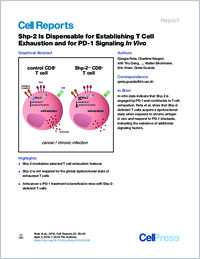Shp-2 is dispensable for establishing T cell exhaustion and for PD-1 signaling in vivo
- Rota, Giorgia Department of Biochemistry, University of Lausanne, 1066 Epalinges, Switzerland
- Niogret, Charlène Department of Biochemistry, University of Lausanne, 1066 Epalinges, Switzerland
- Dang, Anh Thu Department of Biochemistry, University of Lausanne, 1066 Epalinges, Switzerland
- Ramon Barros, Cristina Department of Biochemistry, University of Lausanne, 1066 Epalinges, Switzerland
- Fonta, Nicolas Pierre Department of Biochemistry, University of Lausanne, 1066 Epalinges, Switzerland - Institute for Research in Biomedicine (IRB), Faculty of Biomedical Sciences, Università della Svizzera italiana, Switzerland
- Alfei, Francesca Division of Animal Physiology and Immunology, School of Life Sciences Weihenstephan, Technical University of Munich, 85354 Freising, Germany
- Morgado, Leonor Department of Biochemistry, University of Lausanne, 1066 Epalinges, Switzerland
- Zehn, Dietmar Division of Animal Physiology and Immunology, School of Life Sciences Weihenstephan, Technical University of Munich, 85354 Freising, Germany
- Birchmeier, Walter Cancer Research Program, Max Delbrueck Center for Molecular Medicine (MDC) in the Helmholtz Society, 13125 Berlin, Germany
- Vivier, Eric Centre d’Immunologie de Marseille-Luminy, Aix Marseille Université, Inserm, CNRS, 13288 Marseille, France - Service d’Immunologie, Hôpital de la Timone, Assistance Publique-H^opitaux de Marseille, 13005 Marseille, France - Innate Pharma Research Labs, Innate Pharma, Marseille, France
- Guarda, Greta Department of Biochemistry, University of Lausanne, 1066 Epalinges, Switzerland - Institute for Research in Biomedicine (IRB), Faculty of Biomedical Sciences, Università della Svizzera italiana, Switzerland
-
03.04.2018
Published in:
- Cell reports. - 2018, vol. 23, no. 1, p. 39-49
Shp-2
Ptpn11
T cell exhaustion
Inhibitory receptors
PD-1 : Checkpoint therapy
Cancer
Chronic infection
English
In chronic infection and cancer, T cells acquire a dysfunctional state characterized by the expression of inhibitory receptors. In vitro studies implicated the phosphatase Shp-2 downstream of these receptors, including PD-1. However, whether Shp-2 is responsible in vivo for such dysfunctional responses remains elusive. To address this, we generated T cell- specific Shp-2-deficient mice. These mice did not show differences in controlling chronic viral infections. In this context, Shp-2-deleted CD8+ T lymphocytes expanded moderately better but were less polyfunctional than control cells. Mice with Shp-2-deficient T cells also showed no significant improvement in controlling immunogenic tumors and responded similarly to controls to α-PD-1 treatment. We therefore showed that Shp-2 is dispensable in T cells for globally establishing exhaustion and for PD-1 signaling in vivo. These results reveal the existence of redundant mechanisms downstream of inhibitory receptors and represent the foundation for defining these relevant molecular events.
- Language
-
- English
- Classification
- Biological sciences
- License
- Open access status
- gold
- Identifiers
-
- RERO DOC 326733
- DOI 10.1016/j.celrep.2018.03.026
- ARK ark:/12658/srd1318946
- Persistent URL
- https://n2t.net/ark:/12658/srd1318946
Statistics
Document views: 205
File downloads:
- Texte intégral: 328
